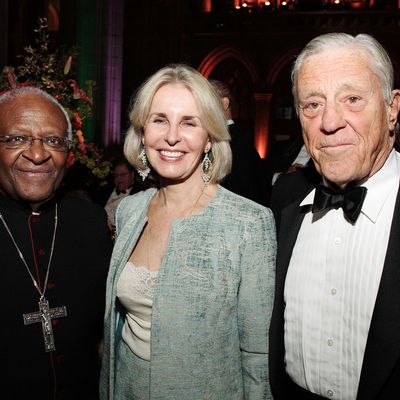
After pretty much the entire journalistic world has made fun of Sally Quinn’s weekend Washington Post essay declaring the End of Power, further abuse may seem unnecessarily cruel. And yet even the fulsome stream of disparagement directed at Quinn has not adequately conveyed the full awfulness of her piece.
Quinn, a Washington Post writer and wife of Post editor Ben Bradlee, is the reigning queen of Washington dinner party culture. Her essay broadly belongs to a particular genre that I think of as a cargo cult of bipartisanship focused on dinner parties. Cargo cults are a phenomenon of tribal societies that came into contact with advanced societies, coveted the advanced industrial goods they shipped in (cargo), and failed to understand why the cargo stopped appearing when the Westerners left. They often attempt to summon it back by constructing crude, wood-and-straw imitations of landing strips, radios, or imitating other rituals they observed.
The bipartisanship cargo cult in Washington is a rather sad tribe of people that laments the decline of bipartisanship, fails to grasp the larger historic forces that made bipartisanship appear and then disappear, and concludes that the problem is the lack of dinner parties. This is, believe it or not, an extremely common belief in our capital city. Seriously. Hardly a week goes by without somebody blaming partisan polarization on the lack of proper dinner parties or, in an occasional twist, lunch.
Quinn’s essay follows the general contours of this genre, but she adds her own uniquely mortifying touches. Her mourning of the decline of the Georgetown dinner party sweeps together such disparate trends as the appearance of a Kardashian at the White House Correspondents’ Dinner, Citizens United, hard times at newspapers, and the appearance on the scene of “25-year-old bloggers.” The result of all these baffling developments is that Quinn now has to have dinner with actual friends and not just people using each other for access to power:
In the past, we might have attended five-course dinners a couple of nights a week, with a different wine for each course, served in a power-filled room of politicians, diplomats, White House officials and well-known journalists. Those gatherings don’t exist anymore. Now, we host and go to small dinners with close friends, dinners with some meaning to them, dinners that are celebrations of something.
Poignant!
It’s certainly true that the Washington power structure no longer exists in quite the same way it once did, identifiable by its attendance at fashionable Georgetown dinner parties. But it’s also probably true that if such an identifiable elite did exist, they probably — to be perfectly brutal about it — wouldn’t be having dinner at Sally Quinn’s home all the time. People who make their social engagements solely on the basis of career advancement aren’t going to spend that much time currying favor with a man who retired two decades ago from the executive editorship of a newspaper that no longer carries the same cachet.
When assessing Quinn’s sense of the Lost Eden of Washington, we should also have a firmer sense of what the culture was actually like. Here is one scene from Quinn’s inculcation into the Washington elite:
Washington writer Sally Quinn told of a 1950s reception where: “My mother and I headed for the buffet table. As we were reaching for the shrimp, both of us jumped and let out a shriek. Senator Strom Thurmond, grinning from ear to ear, had one hand on my behind and the other on my mother’s. As I recall, we were both quite flattered, and thought it terribly funny and wicked of Ol’ Strom.”
Once Washington was a happy place where a girl and her mother could be groped simultaneously in good fun by a white supremacist. Sadly, it has all been ruined by Kim Kardashian and Ezra Klein.






























